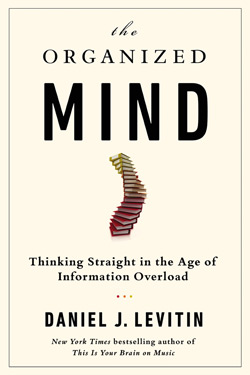 Learn how to file your thoughts
Learn how to file your thoughts
Published by: Dutton Adult [August 19, 2014]
ISBN-13: 978-0525954187
Pages: 528
Price: INR 780
Have you ever lost your keys or cell phone? Have you wondered why some things get lost more often than others? Have you ever taken an inventory of your ‘miscellaneous/junk’ drawer and noticed rubber bands, old batteries, maybe an unnamed CD or DVD, some loose change, ticket stubs, assorted pens that don’t write and half a dozen other things you are afraid to throw away as they might be needed the minute they are tossed out?
The author, Daniel Levitin, professor of behavioural neuroscience at McGill University, explains that organised people don’t tend to lose things as often as others. When everything has an allotted place—in the house, and in your memory—there is minimal chance of things ever getting lost. And when we have things that don’t easily fall into a predefined category and cannot be organised in a coherent manner, we tend to file them under the ‘miscellaneous/junk’ section, both physically and mentally. And we need that.
Now, what happens when we have way more things than slots to organise them in? That’s where we run into issues.
In today’s information age, everything from online passwords to ATM PINs vie for our memory; we have too many choices in everyday products that we can buy, from pens and soaps to clothes and food; we have an information overload from various media and devices that we use everyday in the hope that it will keep our lives on track. With all the things that compete for our attention daily, why are we not completely bogged down? How are we able to carry on?
One important development of the human mind is the attention filter, one of evolution’s greatest achievements. It ensures that we separate the trivial and the nonessential from the significant and the meaningful, thus ensuring our survival.
The book introduces the four components of our attentional system—the default or ‘mind-wandering’ mode; the central executive mode; the attentional filter; and the attentional switch that moves us from one mode to the other. Our default mode probably caused us to lose the keys. Then, the central executive mode kicks in and tells us that we must search for those keys. The attention filter makes us focus on the task at hand, excluding all other distractions. And the attentional switch moves us from active searching to stepping back and giving up the search.
The author proposes that one of the traits of highly successful people is that they are fully present in the moment; and they are able to do that because they have external attention filters —their assistants and staff—to handle the daily tasks of organising the scheduling. This leaves them free to concentrate on what’s at hand without worrying about what else should they be doing to be more productive and efficient.
The book is organised in three parts. Part one sets up the scenario where we have too much information and too many decisions to make in our current lifestyle, and explains how attention and memory work. Part two is all about organising—our homes, our social lives, our business, our time, and all the information we need to make the hardest decisions. Part three gives a glimpse of the future by laying out what to teach our children, and finally the significance of having a ‘junk drawer’ to make our lives manageable.
The takeaway for me was two-fold. Firstly, having information at our fingertips is not enough, we need a way to sift through the information and use it to accomplish our tasks, to reach our goals. Secondly, organising helps us be more efficient and productive, but rather than handle it all in our brains, we must shift the burden to the external world. Having a working knowledge of our brain’s mechanics will help us organise our home, our time, as well as our professional and social lives.
This was first published in the December 2014 issue of Complete Wellbeing.

